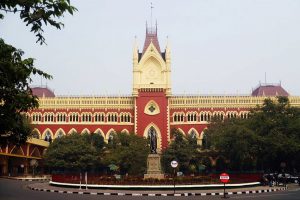Calcutta High Court: A Division Bench of Sanjib Banerjee and Suvra Ghosh, JJ. allowed the appeal filed by two persons who were convicted by the trial court for offence of waging war against the Government of India and set aside the judgment on the grounds of absence of a link between accused and alleged charges.
In the present case, the police received information about a meeting being held at a village where seditious lectures were being delivered. A few members of the said assembly of 30 to 40 people had firearms with them. When police arrived at the spot, the people started fleeing and accused-appellants herein were arrested. Certain seditious pamphlets and leaflets were recovered from their possession. A complaint was registered against them and chargesheet was filed against the appellants and charges were framed against them under Sections 121 A, 122, 124 A of Penal Code, 1860, Sections 25(a) and 35 of Arms Act, 1959 and Sections 4 and 5 of Explosive Substances Act, 1908. The appellants pleaded not guilty to the charges and the trial court convicted the appellants of the charges levied against them and sentenced them accordingly. Being aggrieved by the said judgment, the appellants preferred this appeal.
Counsels for appellants Amarta Ghose, Anirban Tarafder, Somdhuti Parekh, Rimpa Rajpal submitted that the witnesses were forcibly brought by the police which was not required, since under Section 87 of the Code of Criminal Procedure, 1973 the Court had ample power to ensure attendance of witnesses and prosecution had no power with regard to same. It was submitted that neither any explosive substance was recovered from the place of occurrence nor was any firefight was detected. Further, no incriminating article was found either in the possession of the appellant or in his house.
According to prosecution, in order to avoid delay in the trial of the case due to the absence of witnesses, the police took it upon themselves to bring the witnesses to Court and arrange for their stay. There was no suggestion to the fact that the police influenced or coerced the witnesses to adduce evidence or tutored them. It was submitted that since guilt of the appellants had been proved to the hilt and that conviction must be affirmed.
The Court noted that in their statements recorded under Section 313 of the Code, the appellants/accused gave a detailed account regarding their arrest, detention, search and seizure which sharply contradicted the case made out by the prosecution. It observed that the arresting officers had not followed the procedure laid down in D.K Basu v. State of West Bengal, (1997) 1 SCC 416. It was further opined that no firearm or ammunition was seized from the possession of the accused-appellants and such arms or ammunition were also not found in any premises occupied by them. Therefore, no responsibility could be thrust upon them for a commission of any offence under the Arms Act, 1959. Lastly, no explosive substance was recovered from the alleged place of occurrence, and thus offence under Explosives Act also could not be made out.
In view of the above, the Court held that prosecution had miserably failed to establish the charges levied against the appellants and there was no evidence on record that linked accused-appellant to the alleged charges. It was observed that the prosecution case suffered from severe contradictions and thus benefit of doubt could be granted to the appellants.
The Court also opined that it was trite law that the burden of proving a charge against an accused lied solely upon the prosecution and the prosecution was required to bring evidence which should be cogent, compact, believable and trustworthy as to become incompatible with the innocence of the accused. It was opined that the trial court had failed to appreciate the evidence in the proper perspective and missed the salient point that the link between the appellants and the incriminating material produced by the prosecution was non-existent. Thus, the appeal was allowed and the impugned judgment was set aside.[Patit Paban Halder v. State of West Bengal, CRA No. 337 of 2006, decided on 21-06-2019]

